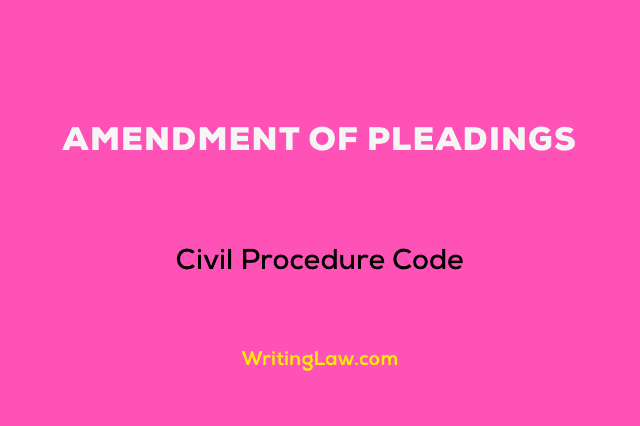
Order VI, Rule 17 of the Civil Procedure Code talks about amendment of pleadings.
At any stage of proceedings, the court may allow the plaintiff or defendant to amend his pleadings. The amendment to pleadings shall be made necessary if it determines the real questions in controversy among parties.
Proviso: But if the trial has commenced, then application for amendment shall not be allowed unless the court concludes that in spite of due diligence, the matter could not have been raised before.
What is meant by Amendment of Pleadings at Any Stage of Proceeding
The 2002 amendment inserted the phrase ‘at any stage.’ It means ‘prior to trial.‘
The party who desires to make an amendment to its pleading must raise the matter before the trial commences. After trial, the court shall not allow the party to amend unless the party qualifies the condition of due diligence laid down in proviso.
What is Due Diligence in Making Amendment
The word due diligence means reasonable care or caution, which an ordinary man must exercise as conduct in his affairs. The party must prove before the court that in spite of reasonable care and caution, it was not possible to raise the issue earlier. The party must prove that there is no intentional mistake or error on their part. The actions of the party must be bonafide.
What Amendments are Necessary
All amendments are necessary, which determines the real questions in controversy between the parties. A court before allowing amendment must consider the following points:
1. The court must examine the issue of whether it is in the interest of justice or not.
2. Before allowing the amendment, a court must be satisfied with the fact that amendment is necessary for determining the real questions in controversy.
3. If the matter raised for amendment prevents multiplicity of suits, the court may allow it.
4. The court must be satisfied that the party seeking amendment has exercised due diligence, and the applicant is not mala fide (bad intention).
When Court Shall Not Allow Amendment of Pleading
It is the discretionary power of the court to allow for amendment. All the rules of procedure are the handmaids of justice. Every action of the court is to achieve the ends of justice.
1. If allowing the amendment causes injustice to the other party, then it shall not be permitted. or,
2. If the amendment proposed in pleading entirely changes the nature of a suit, it shall not be allowed. or,
3. If the application for amendment in pleading is made mala fide, it shall not be allowed.
Finally: The amendments made under Order VI, Rule 17, are voluntary amendments for ratifying one’s own error or default.
- 18 Most Important Amendments to the Indian Constitution - 12th August 2023
- 8 Kinds and Theories of Punishment - 22nd July 2023
- What Is the Meaning of Res Judicata in Civil Procedure Code? - 22nd January 2023








If the amendment application made and not accepted what is remedy.
If the application for amendment changes the nature of a case or is not necessary for determination of real question in controversy between the parties then the amendment shall not be allowed by the court. If amendment application is made mala-fide or totally changes the material issues in a case then it won’t be addressed by the court of law. A person may go for appeal for the order issued by the court not allowing amendment.